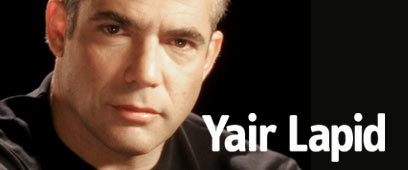

I recently asked Ami Ayalon (who is running against Ehud Barak for chairman of the Labor party) for an interview. He turned me down. I asked him why and was told that Ayalon thinks I was horrible to him the last time he appeared on my television show. I took the videotape from the archive and I think he is exaggerating, although I understand what he is talking about. Where is it written that he has to agree to a return engagement when he felt ill-at-ease the first time around? Who said I could punch him without having to pay the price?
Something is happening. As it is with social trends, it is not happening all at once but gradually: Even politicians have had enough. For years they would show up at TV or radio studios – or the newspaper offices – knowing they were about to take a beating. They knew that reporters scrutinize each other with magnifying glasses. Did you let him have it? You went easy on him? How much did you let him have? Eventually they too have become fed up so they have decided to shut up.
Surprisingly – or maybe not – it turns out that silence is not hurting them. For Barak, it has won the center of the political stage; Livni’s silence helped to establish her stature (it was one of those rare times when she spoke this year that she almost ruined everything for herself).We are all certain that Gabi Ashkenazi is doing something right ever since he stopped caring about us journalists.
In the last couple of years there have been a number of scholarly articles bemoaning the deterioration of the public debate in Israel. It sounds pretty academic. It’s something that professors of communications lecture about to their sleepy students. But in nature – mostly in human nature – every pro draws a con.
The Israeli press has reached record levels of sarcasm, scorn and contempt and now it’s payback time.
The photo of Defense Minister Peretz looking through field glasses that were still capped is a classic example. I admit that it is difficult to resist the temptation because of the humor of such a situation. The defense minister views a military training exercise and he can’t see a thing.
But Amir Peretz was a munitions officer in the paratroopers and, as such, has had to peer through lots of field glasses. He also sustained serious wounds in a military accident while his platoon was positioned at the Mitla Pass and still suffers pain from the leg wound. I truthfully don’t know what I would do if I was the night editor on the news desk and this photograph came across my desk. I hope that I would at least discuss going easy on him. Sometimes it’s okay to spike the joke rather than spite a man’s honor.
In off-the-record talks with politicians, it is always surprising to hear how angry and frustrated they are with the media. They think the media treats them unfairly and disrespectfully, is superficial and arrogant, influences crucial policy decisions with breath-stopping irresponsibility. They won’t admit this out loud because they are scared, although less so of late. This is because they feel – and it is always wrong to ignore the honed instincts of the average Israeli politician – that the public is behind them on this.
Is the drop in newspaper readership merely a result of the internet? Is it purely coincidence that most of the television shows with political content have been cancelled? Are the shrinking audiences for television news shows a seasonal phenomenon? The last war caused the public to voice its anger at the media but the process started much before that. Bibi Netanyahu once said that in his opinion the Israeli media harangues him more than anyone else. Several weeks later I interviewed Shimon Peres who said with half a smile: “Bibi has nothing to show off about. The media takes more swings at me than at him.”
These two were - and have remained - among the country’s most popular leaders. Only Sharon had a higher approval rating and he only gave a couple of interviews a year to the press and even then would always mention that he never reads the newspapers.
In the end a balance will have to be reached. The politicians will resume talking because they need it. And we will talk to them more politely because without our audience we do not exist. The only question remaining is why not start now?
A super-sized life
Morgan Spurlock is a 36-year-old American. He’s tall, with a pinkish complexion and a light beard which testifies to his Scottish heritage. He is also thin, not something to be taken lightly since Spurlock is the creator of the famous documentary "Super Size Me." For a full month he ate at Macdonald’s three times a day. Each time the staff offered to super size his order - he agreed. As result, he gained weight, became impotent, had chest pains, fatigue, nausea and liver malfunction. The scene in which he throws up in front of the camera is no less than unforgettable. The film has become the fourth-most viewed documentary in history. More than 50 million people have seen it.
Spurlock is in Israel to make a documentary film about the Israel Arab conflict and came to see me. It is always difficult to decide whether or not to participate in these kinds of films. On the one hand, it is very important that the Israeli side is heard but on the other side, we never come out well.
“But why?” he asks. “Why don’t you Israelis ever come out well?”
Because it is possible to film only one side of the story, I tell him. It is possible to film the military checkpoints, the security wall and the Palestinian grandmothers standing in line and the chilling story of the young woman who miscarried as she waited at the Gaza border for an entry permit in order to get to the hospital. There is nothing easier than to film how heartless and brutal Israel’s security measures are.
However, it is much more difficult to film the hundreds and thousands of people whose lives have been saved because of these tough measures. Among us there are infants, pregnant women and elderly women, Holocaust survivors, teenagers whose lives have been saved by those checkpoints and that wall. And because their lives have been spared, we have no idea who they are or where they live and there is no way to hear their stories, to film or interview them.
Spurlock is a decent enough fellow to know that I am right but he is still a filmmaker. He will shoot what is possible to film and we will have to eat it. The question is how much.















